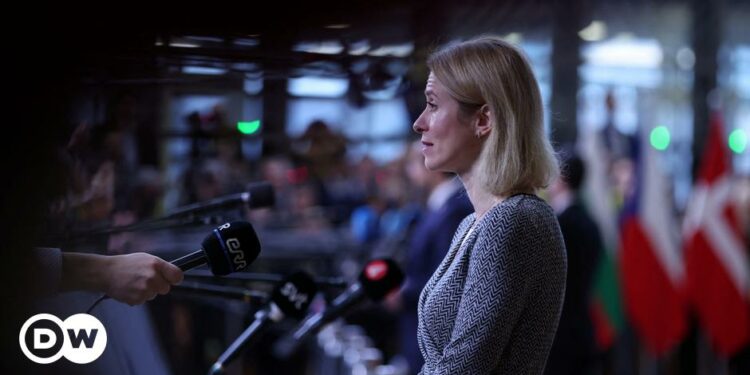Kallas expressed support for Israel’s right to defend itself and denounced Hamas, which the EU designates as a terrorist organization. She has also backed a two-state solution and called for a cease-fire.
Later, still in her position as Estonia’s prime minister but poised to climb the EU hierarchy, her government increased its funding for humanitarian aid to Gaza. Though Estonia does not recognize a Palestinian state, the country, under Kallas’s leadership, backed a United Nations resolution to upgrade the Palestinian territories’ observer state status to full membership.
EU debates conflict between Israel and Palestine, October 2023Image: FREDERICK FLORIN/AFP
Will Kallas build a consensus in the Israeli-Palestinian conflict?
Evin Incir, a Swedish MEP with the left-leaning Socialists and Democrats (S&D) parliamentary group, said that she was concerned that Kallas has not thus far prioritized the humanitarian situation in Gaza and wasn’t as vocal as the S&D group expected her to be.
“We want someone as vocal as Borrell, and we will be looking out for assurances in the hearing,” Incir told DW, referring to the confirmation hearing for EU commissioners still to be held in European Parliament.
Borrell has advocated for the EU to redouble its efforts to bring about a two-state solution and, earlier this year, hosted Israeli and Palestinian foreign ministers to advance this goal. He condemned the death toll in Gaza as a “bloodbath,” threatened to sanction Israeli ministers and backed the request from the International Criminal Court (ICC) to issue arrest warrants against Israel’s Prime Minister Benjamin Netanyahu and Hamas officials.
“More than 40,000 people have died in Gaza,” Incir emphasized. “My group and I will push for a humanitarian, values-based EU policy on Israel and Palestine.”
Others indicated that Kallas’s support for a two-state solution was ill-timed. “It is pointless to only talk about the two-state solution” without the right conditions in place, said Mandl, the Austrian MEP.
In contrast, Mika Aaltola, a Finnish MEP in the European People’s Party, the EU’s largest parliamentary group, expressed firm faith in Kallas’s ability to achieve consensus.
“As far as I understand Kallas, she is a consensus builder, and she is pragmatic,” he told DW.
Gaza: Deadly Israeli strike on al-Mawasi ‘safe zone’ camp
To view this video please enable JavaScript, and consider upgrading to a web browser that supports HTML5 video
Kallas to combat the charge of ‘double standards’ but stay focussed on Ukraine
Kristi Raik, deputy director of the ICDS, told DW that Kallas “will probably try to address criticism around EU’s alleged double standards,” in reference to a view that the EU upholds international law against enemies but not allies.
Kallas said in November that Israel “is fully entitled to defend itself. But it must do so in a way that spares innocent lives and adheres to the norms of international law.
“Inciting a crisis in the region benefits no one other than those interested in drawing our attention away from other issues and undermining our unity,” she said, alluding that Russia could benefit if global attention shifted from Ukraine to the Middle East.
Israelis hope they could benefit from Kallas’s focus on Ukraine if she decided to review the EU’s Iran policy. An influential Israeli lobbyist who spoke to DW on the condition of anonymity said that Kallas may be better placed to see the Iranian threat.
“There is a likely convergence, or common cause on Iran as it provides missiles and drones to Russia and threatens European security,” he said.
Whatever policy Kallas finally adopts toward Israel, no one on either side of the Israeli-Palestinian debate in the EU has any doubt that her policy will be influenced by whoever wins the elections in the US.
Edited by: Davis VanOpdorp
Source link : https://www.dw.com/en/how-will-the-eus-new-top-diplomat-approach-israel/a-70189554
Author :
Publish date : 2024-09-11 07:00:00
Copyright for syndicated content belongs to the linked Source.


